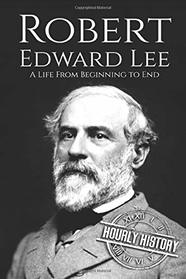In order to understand Robert E. Lee's decision to fight for Virginia instead of the Union, readers need to grasp a fundamental difference between the 1860s and today. At that point in our history, people pledged allegiance to their state before they would worry about their country. State's rights were much more important then. It wasn't until after we almost lost our union that people began to be patriotic to the country as a whole. If you do genealogy as I do, then you have seen records of your ancestors fighting in state armies or militias.
Lee went to West Point and did not receive a single demerit (from what I've heard this is an impossible task). I've also heard he is the only man ever to emerge from West Point without a demerit. He graduated second in his class. I had to find out who was first and his name was Charles Mason. He graduated with an overall score of 1995.5 (out of possible 2000) and Lee graduated with 1966.5 points. Interestingly, they still have the two highest points in the history of West Point. Douglas MacArthur is third.
Lee and Ulysses S Grant would meet and be colleagues in the Mexican-American War, some 20 years prior to the Civil War. Because they worked so closely together, I'm sure they learned each other's methods during this critical time that they would use (against each other) in the Civil War.
Skipping over the fascinating recitation of the leading up to and progress of the war, I jump to the letters exchanged between Grant and Lee before the surrender. Thank you to the author for giving these large excerpts of each man's writings. They certainly tell a bit about each man. I did not know that Lee was indicted by a federal judge (people wanted to punish the ringleaders of the Confederacy, of which Lee was one). Only direct action by Grant going to President Andrew Johnson stopped the prosecution.
Lots of folks don't know that Arlington Cemetery's buildings and lands belonged to General Lee's family and was confiscated to become the hallowed ground of Arlington National Cemetery. Eventually, the family would receive restitution, but not during Lee's lifetime. When Grant was elected president, Lee was the highest-profile Southerner invited to the White House.
In the Conclusion, the author makes a good point that Lee's support of the Confederacy's ideology was lukewarm. He was not a strong supporter of slavery.
Lee went to West Point and did not receive a single demerit (from what I've heard this is an impossible task). I've also heard he is the only man ever to emerge from West Point without a demerit. He graduated second in his class. I had to find out who was first and his name was Charles Mason. He graduated with an overall score of 1995.5 (out of possible 2000) and Lee graduated with 1966.5 points. Interestingly, they still have the two highest points in the history of West Point. Douglas MacArthur is third.
Lee and Ulysses S Grant would meet and be colleagues in the Mexican-American War, some 20 years prior to the Civil War. Because they worked so closely together, I'm sure they learned each other's methods during this critical time that they would use (against each other) in the Civil War.
Skipping over the fascinating recitation of the leading up to and progress of the war, I jump to the letters exchanged between Grant and Lee before the surrender. Thank you to the author for giving these large excerpts of each man's writings. They certainly tell a bit about each man. I did not know that Lee was indicted by a federal judge (people wanted to punish the ringleaders of the Confederacy, of which Lee was one). Only direct action by Grant going to President Andrew Johnson stopped the prosecution.
Lots of folks don't know that Arlington Cemetery's buildings and lands belonged to General Lee's family and was confiscated to become the hallowed ground of Arlington National Cemetery. Eventually, the family would receive restitution, but not during Lee's lifetime. When Grant was elected president, Lee was the highest-profile Southerner invited to the White House.
In the Conclusion, the author makes a good point that Lee's support of the Confederacy's ideology was lukewarm. He was not a strong supporter of slavery.




